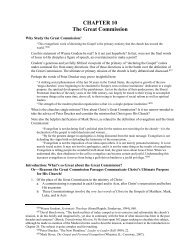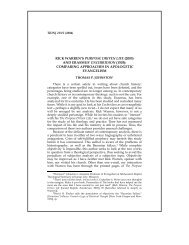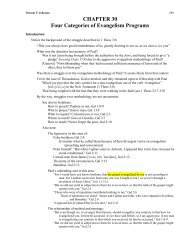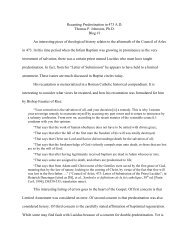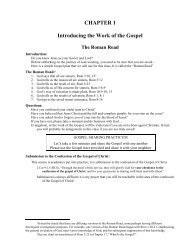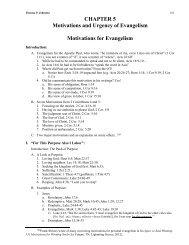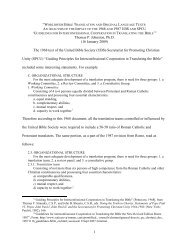CHAPTER 7 Defining Evangelizing - Evangelism Unlimited
CHAPTER 7 Defining Evangelizing - Evangelism Unlimited
CHAPTER 7 Defining Evangelizing - Evangelism Unlimited
Create successful ePaper yourself
Turn your PDF publications into a flip-book with our unique Google optimized e-Paper software.
Thomas P. Johnston 389<br />
transliterated into the English as “confess,” which in English is used primarily in the<br />
sense of “admitting” or making a “profession” within a church. In this sense, note<br />
Webster’s English definition for “confess ”is somewhat tangential to NT usage of<br />
this term. 513<br />
New Testament use of the verb o`mologe,w, however, seems to be much more public and<br />
initiative than is currently communicated by the English verb “confess,” which has a<br />
passive feel to it:<br />
See for example (by way of introduction):<br />
Matt 7:23, “And then I [Jesus] will declare [o`mologe,w] to them, “I never knew you;<br />
depart from Me, you who practice lawlessness’”<br />
Matt 14:7, “Thereupon he [Herod] promised [o`mologe,w] with an oath to give her [the<br />
daughter of Herodias] whatever she asked”<br />
John 1:20, “And he [John the Baptist] confessed [o`mologe,w], and did not deny, and he<br />
confessed [o`mologe,w], ‘I am not the Christ.’”<br />
John 9:22, “His parents said this because they were afraid of the Jews; for the Jews had<br />
already agreed, that if anyone should confess [o`mologe,w] Him to be Christ, he<br />
should be put out of the synagogue.”<br />
John 12:42-43, “Nevertheless many even of the rulers believed in Him, but because of<br />
the Pharisees they were not confessing [o`mologe,w] Him, lest they should be put out<br />
of the synagogue; for they loved the approval of men rather than the approval of<br />
God”<br />
Acts 23:8, “For the Sadducees say that there is no resurrection, nor an angel, nor a spirit;<br />
but the Pharisees acknowledge [o`mologe,w] them all”<br />
Acts 24:14 (Paul to Felix), “But this I admit [o`mologe,w] to you, that according to the<br />
Way which they call a sect I do serve the God of our fathers, believing everything<br />
that is in accordance with the Law, and that is written in the Prophets”<br />
Rom 10:9, “that if you confess [o`mologe,w] with your mouth Jesus as Lord, and believe<br />
in your heart that God raised Him from the dead, you shall be saved;<br />
[Note how one little change in this verse changes, adding “as” emphasizes the<br />
element of making a “confessional” statement, rather than an evangelistic<br />
profession, e.g. note the KJV on this verse “That if thou shalt confess with thy<br />
mouth the Lord Jesus”]<br />
Rom 10:10, “for with the heart man believes, resulting in righteousness, and with the<br />
mouth he confesses [o`mologe,w], resulting in salvation.”<br />
1 Tim 6:12, “Fight the good fight of faith; take hold of the eternal life to which you were<br />
called, and you made the good confession [kai. w`molo,ghsaj th.n kalh.n o`mologi,an]<br />
in the presence of many witnesses.”<br />
[Here Paul congratulates and encourages Timothy who “confessed a good<br />
confession”; note the KJV on this phrase, “and hast professed a good profession<br />
before many witnesses”]<br />
scelus: amorem nutrici, O.: se victos, Cs.: se, reveal, O.: deam, V.: se hostem: hoc de statuis: hoc confiteor iure Mi<br />
obtigisse, T.: sese plurimum ei debere, Cs.: largitionem factam esse: O cui debere salutem confiteor, O. — Fig., to<br />
reveal, manifest, show: confessa voltibus iram, O” (Charlton T. Lewis, An Elementary Latin Dictionary [1890]).<br />
512 The following may show how Jerome translated the Greek verb o`mologe,w into Latin, assuming that the<br />
Greek text that he translated from was similarto the text that is available to us today (Byzantine or Nestle-Aland):<br />
(1) As a verbal phrase with the adjective confessus (1a) “make [a] confession” (confessus fuerit), Luke 12:8; Rom<br />
10:10; 1 John 4:15 (1b) “do confession” (confessus est), John 1:20 (twice); (1c) “confessed a good confession”<br />
(confessus bonam confessionem), 1 Tim 6:12;<br />
(2) As the verb “confess” (confiteor), Matt 7:23; 10:32 (twice); John 9:22; 12:42; Acts 23:8; 24:14; Rom 10:9; Tit<br />
1:16; Heb 11:13; 13:15; 1 John 1:9; 4:2; 2 John 7; Rev 3:5;<br />
(3) As the verb solvo meaning, “loosen, unbind, unfasten, unfetter, untie, release,” 1 John 4:3 (the “New” Vulgate<br />
[by order of Paul VI, and authorized by John Paul II] solved the problem with this translation by using the<br />
standard confiteor).<br />
513 “Confess: (1) to tell or make known (as something wrong or damaging to oneself): ADMIT; (2a) to<br />
acknowledge (sin) to God or to a priest; (2b) to receive the confession of (a penitent); (3) to declare faith in or<br />
adherence to: PROFESS; (4) to give evidence of ~ (1): (4a) to disclose one’s faults; specifically: to unburden one’s sins<br />
or the state of one’s conscience to God or to a priest; (4b) to hear a confession; (2) ADMIT” (Webster’s New Collegiate<br />
Dictionary [Springfield, MA: Merriam, 1977]).



